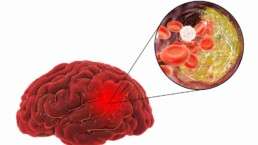Dr. Good Deed’s Health Clinic in Patna! Our team of skilled generalphysicians, Neurologist and gastroentrologist experts provides comprehensive healthcare solutions. Enjoy minimal wait times at our convenient Kankarbagh and Boring Road clinics. Experience the convenience of online consultations for quality healthcare from home.
What is brain clot?
When a blood vessel bursts, filling with blood and blocking a vessel, bleeding occurs in the brain. When this happens, the brain is severed and oxygen is lost. Brain cells are damaged and death can occur.
Others may have more severe problems, such as seizures or death, while some people may only experience a moderate episode of this occurrence. However, you can experience several warning signals that you should be on the lookout for even before any of these take place. If you notice any of these signs, you should seek treatment for a blood clot in the brain.

What Causes Blood Clots in the Brain?
As bad as it can get is a blood clot in the brain. This potentially fatal condition, also known as thrombosis, can develop at any time, anywhere, and in anyone. Of course, some circumstances make some people more likely than others to develop a brain clot. A brain clot is not necessarily inevitable, though.
Far from it, there are numerous causes for brain blood clots. Blood clots typically develop suddenly and can result from a variety of conditions, including inflammation, artery shrinking, external head injuries, and more. But if you pay close attention, there are some warning indicators you can look out for.

Types Blood Clot
Thrombosis
When a blood artery in the body is injured and filled with blood, thrombosis occurs and a blood clot forms. Trauma or any other medical issue could be to blame for this. These blood clots don’t move.
Embolism
When a foreign object blocks an artery, embolism ensues. This can happen if a blood clot, clotting substance, or even tissue blocks the artery. Normally, these blood clots shift from their initial location to another area of the brain.
Risk Factors for the Development of Blood Clots in the Brain
Numerous factors can result in a blood clot growing in or ascending to the brain and wreaking havoc, according to medical professionals. Of fact, there are some situations in which even the most cutting-edge area of medicine is unable to identify the reason for a particular clot formation. Let’s look at how a blood clot ends up in the brain for the time being.
Trauma
One of the most frequent causes of blood clots in the brain is head trauma. A clot is all too common if there is any external stimulus that causes a severe impact on the head. Blood clots can form in the brain as a result of falls or head trauma. It is a built-in feature intended to stop bleeding out. But the clots also prevent blood from flowing freely through the brain, resulting in spasms and problems that frequently result in strokes or even death.
Portable Clot
An embolus is a blood clot that crosses the blood-brain barrier from a damaged area of the body to the brain. Blood clots called emboli travel through the bloodstream, often through arteries but occasionally through veins.
Other Elements
Numerous other variables, such as obesity, neonatal complications, dialysis, shock, and dysrhythmias, are also among the main causes of blood clot in the brain. You might ask your doctor for a more thorough examination of the causes of blood clots in the brain because the list is lengthy.
Blood Clots in the Brain Symptoms
There are numerous indications of a blood clot in the brain that demand attention.
- recurrent, severe headaches
- sudden speech slowing or slurring, for example
- blurry vision
- dysfunctional motor functions
- Seizures
- alteration in personality
- Dizziness
- (Whole or partial) paralysis.


Brain Blood Clot Diagnosed
Blood tests – The doctor will do a blood test to check for specific indications of a brain blood clot. In order to determine whether the brain is bleeding, it will check for protein in the bloodstream.
Ultrasound – An ultrasound scan can be used to measure the brain’s size and form. This could provide information about the location and potential origin of the blood clot.
CT scan -Using a CT scan, blood clots in the brain can be found. They are more precise than other imaging methods and can offer more specific details about the type of blood clot.
MRAs (magnetic resonance angiography) can be used to examine blood arteries and spot any blockages or abnormalities. Additionally, it can be used to check the blood flow in the brain and find the place where the blood clot originated.
V/Q scans can be used to determine the blood’s oxygen content. It can determine the volume of venous and arterial blood flow as well as any blockages or clots in the blood vessels.
What is the course of action for brain blood clots?
If you experience any symptoms, you should get in touch with the best radiologists in Udaipur right away. A cerebral blood clot is treated by:
- Blood thinners: Anticoagulants, also known as blood thinners, are drugs that stop blood from clotting by slowing down the process at which clots form throughout the body. They can be used to stop clots from growing and harming your body permanently.
- Brain surgery: In some serious circumstances, it may be necessary to perform surgery to remove them right from the brain.
- Thrombolytics: These drugs function similarly to blood thinners, but they only relax the tissues around the damaged location when they are injected there, as opposed to inducing edoema like oral anticoagulants do.
What can be done to stop a blood clot from forming in the brain?
In the event of a blood clot in the brain, you can take the following preventative measures:
- Refraining from excessive drinking and smoking
- Keep an appropriate weight.
- Workout each day.
- Consume a balanced diet full of fresh fruits, vegetables, and whole grains.
A blood clot in the brain can also develop as a result of chronic sickness or heart problems.
Modern tools and methods are available in the Geetanjali Hospital’s neurological department to treat any serious disorders of the nervous system.
When to see a Doctor ?
It is imperative to seek medical attention immediately upon experiencing symptoms of a blood clot in the brain. Such symptoms may include sudden and severe headaches, difficulty speaking or understanding speech, weakness or numbness in the face, arms, or legs, and loss of balance or coordination. Prompt medical intervention is crucial in preventing further damage to the brain and potentially life-threatening complications. It is recommended to contact emergency services or visit the nearest hospital without delay. Timely diagnosis and treatment can significantly improve the chances of a successful recovery and minimize the risk of long-term neurological deficits.


